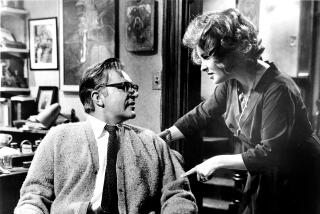In Sickness and in Health
- Share via
Valentines crowd the top of the television console in George and Melba Woodruff’s apartment. They are all to Melba. They are from her husband, the man she met on her 21st birthday, 64 years ago today.
Melba can’t read the cards. She can’t remember how. She can’t remember her husband, except that he is the one who bathes her, dresses her, undresses her, cooks for her and--on special occasions like Valentine’s Day--gives her chocolate.
Alzheimer’s disease has robbed the Woodruffs of the life and romance they once shared. George cooks the macaroni and hamburger casserole they take to a Valentine’s Day potluck Friday night at their Stanton seniors complex. George rolls on her knee-high hose, runs the comb through Melba’s hair and dabs on her lipstick beforehand.
Alzheimer’s has not, however, stolen the love that has been tested over six decades, and endures. Romantic touches linger. On top of a table surrounded by orange vinyl chairs is a music box playing “Love Story,” with him-and-her ballet dancers twirling to the movie theme.
The question of a nursing home has arisen--their three grown daughters are in favor--but Woodruff admits he might have a harder time with it than the woman he tenderly calls “my blue-eyed baby girl.” For now, they are nearly inseparable.
With Melba perched beside him beneath the Robert Woods seascape, smiling blankly as she incessantly smooths her blouse hem, George remembers: “I knew the first time I met her, that was the woman I wanted. I couldn’t tell you what it was. I didn’t want to live without her, is actually what it would amount to.”
And his happiest memory of love?
“The things that can happen in your life, is what it amounts to, the girls growing up, going to school, us coming home to hear the stereo a block away,” he says, laughing as his wife snoozes upright. “Really, love is a lifetime, I would say.”
*
*
It was 1935, St. Valentine’s Day, and George Lawrence Woodruff of Detroit was a sailor in port. At a San Francisco bar, he met a guy whose sister-in-law was celebrating a birthday. She’s a real sweetheart, the man said, and he persuaded Navy boy George to drive with him to the party at the Stockton home of Melba’s big sister.
There was dancing, and drinking, and birthday girl Melba, then a nursing student, was indeed a looker, George recalled. As she left the bathroom, George impulsively grabbed her.
“I grabbed her and I kissed her and I said, ‘You wait, I’m gonna marry you,’ ” he says, and then starts laughing. “She said, ‘Get out of here, you’re drunk.’ ”
Today, her ash-blond hair gone white, Melba Woodruff smiles pleasantly, but her clear blue eyes show no hint of recognition. She murmurs comments that may or may not add up to anything, giggles as she shakes her head. No, she can’t remember that pivotal moment.
The man she came to call Larry--short for his middle name, Lawrence--is at 83 the picture of health, but for some fatigue. His brown-black hair long turned silver, he wears gray wool slacks, a dress shirt and leather wingtips. His wife is wearing a floral shirt and plaid pull-on pants for ease; she is not leaving the house this day except to follow him out to the trash bin.
George goes on with the story of their courting. Although he was in the Navy, his ship, the USS Northampton, stayed on the West Coast. Whenever he made it to the Bay area, he called Melba, who picked him up at the dock.
About six months before his military discharge, on New Year’s Eve, 1938, a mutual friend suggested they ought to consider getting married--that night. So George looked at Melba and she said, why not?
“We got the courthouse to open up at one minute past midnight to give us a license. After that,” George says, “I didn’t see her for six months.”
*
*
When George finally got out of the service, Melba was working as a telephone operator in Oakland. But he couldn’t find work and tired of his wife having to support him. They moved back to Detroit, where George immediately got a job as a tool engineer for General Motors.
Three daughters and several winters later, Melba persuaded him to move the family back to her home state. They settled in Torrance and he hired on with Hughes Aircraft as a tool machinist. After a career in aerospace, George worked for another decade as a security guard and the couple moved to a Fountain Valley apartment, their daughters long since on their own with families and children.
“She was very strong and ran the family,” said daughter Phyllis Schiller, a legal transcriber in San Diego. “She was not a warm, cuddly person. I think he is able to show more of that now. . . . For him to talk about any of this means he’s come a long way. He didn’t really acknowledge how bad off she was until about a year ago.
“He doesn’t think she really knows him most of the time, either,” Schiller added. “I remember one day he stumbled, and she said, ‘Is my husband OK?’ That she referred to him as her husband, that really broke him up.”
George remembers the day vividly. He clutches his palms together between his knees--then he changes the subject. Easier to recount the days that are “nerve-racking,” he says: trying to get Melba to finish a meal, trying to get her to finish making her side of the bed, trying to keep her from redressing at night after he finally gets her into pajamas. That last one, he admits, “really agitates me. It wears me out.”
He is sleeping three or four hours nightly now, losing weight. Their doctor thinks he should consider placing Melba at an assisted-living facility near their apartment--for his own health. He has shopped some. The Alzheimer’s Assn. support groups have helped.
“We’ve been together so long,” he says matter-of-factly, sliding his arm over her shoulder. “I don’t know, to me she’s my left hand. The assisted living [home] is right close, and reasonable. I got to the point where I wasn’t eating or sleeping and I took her to a real nice [short-term] place, Twilight Years, but I was actually more worried with her there four days than when she was here. Part of me was missing, to put it blunt.”
His daughters, who believe he would be better off giving himself something of a life apart, wonder if he will ever make that difficult decision. Says their daughter, Phyllis Schiller: “I think it will be a bigger deal for him than for her.”
*
As the afternoon sun fades, George gets up to check on his pot roast in the crock pot, then returns to their brown floral sofa. Side by side, their shadows on the wall behind them, George talks about past good times. For a month every year, the family traveled throughout the United States when the girls were young. Later, the couple traveled the world: Russia, Europe, China, Australia and exotic cruises galore.
During rough seas crossing between Australia and New Zealand, “the bow was going under water and rising back up, even the crew was getting sick and carrying around bags, and we’re on the deck laughing, saying, ‘What’s the commotion about? We’re up here trying to dance!’ ”
Three kids, seven grandchildren, two great-grandchildren. The memories propel him during bleaker days. Six or seven years ago, it became apparent that his wife was suffering from memory problems. His daughters suspect it emerged even earlier, but their father probably covered for her lapses. The harsh truth came five or six years ago, George Woodruff said.
“We were in Garden Grove,” he recalled quietly. “I will never forget it. I said to her, ‘Do you know who I am?’ And she said, ‘You’re my neighbor. My husband will be right back.’ Oh, man, that was like a knife. That hurt.”
On some level he realizes that he is protecting his memories with the pretense of romance. That it is a one-sided affair now, and that’s OK. It is enough on days like this to be an arm’s reach away.
“For my wife, with love,” reads George’s favorite Valentine’s Day card to Melba.
“I cannot promise you a life of sunshine, I cannot promise riches, health or gold. I cannot promise you an easy pathway, that leads away from change or growing old. . . . But I can promise all my heart’s devotion, a smile to chase away your tears of sorrow. A love that’s ever true and ever growing. A hand to hold in yours, through each tomorrow, two loving arms to shelter and enfold you, encouragement if there be cloudy weather. And all the happiness that love can give you. As, hand in hand, we walk through life together. Happy Valentine’s Day, dear.”
He signs it, “Forever yours, love Larry.”


